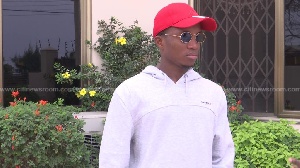- Home - News
- TWI News | TV
- Polls
- Year In Review
- News Archive
- Crime & Punishment
- Politics
- Regional
- Editorial
- Health
- Ghanaians Abroad
- Tabloid
- Africa
- Religion
- Election 2020
- Coronavirus
- News Videos | TV
- Photo Archives
- News Headlines
- Press Release
General News of Wednesday, 6 April 2016
Source: starrfmonline.com
Political parties’ youth debate series underway
African Heights Foundation, a youth civic advocacy group in Ghana, in collaboration with University Debate Societies and other partners in Ghana, is organising a series of debates on university campuses on issues affecting the youth and women as the country heads to another critical election this November.
The youth and women political parties’ debate series, funded by the Open Society Initiative for West Africa (OSIWA), is organised by African Heights Foundation in collaboration with the Debate Societies of some selected public universities. OSIWA plays a dual role in the region as both an advocate and grant-maker by enabling itself to be agenda-setters both within and alongside other organizations working on the ground.
About African Heights Foundation
The African Heights Foundation is a not-for-profit organization, based in Accra, Ghana, dedicated to using the tools of education, advocacy and civic participation to raise leaders and active citizens excelling in various sectors of society in Ghana and Africa.
The Foundation aims at strengthening democratic values and increasing citizens’ participation in decision making processes and thereby contributing to improved policies and practices that affects people’s lives.
The Foundation also focuses on developing leaders and citizens with a sound understanding and a deep commitment to quality education, democracy, economic development and human rights as underlying values for building a peaceful, prosperous and ambitious country.
Overview
The Political Parties’ Youth Debate Series will see the youth and female representatives of political parties in Ghana debating policies and issues in the run-up to the November 2016 elections.
This activity is meant to decentralize the concept of the presidential debates and provide a civil platform for political engagement for young and female politicians.
The Foundation, with a focus on youth, women and the marginalized in the society deems it prudent in organizing debates between the youth/women representatives of the various political parties to debate on issues relating to the youth, women and vulnerable people, and elaborate on the position of their parties on issues as well as their political values.
This platform is to further promote issue-based campaign, and also allow the representatives to further explain the policies of their parties and for better interrogation by the youth for accountability.
The debate is being held in four major public universities namely the University for Development Studies Tamale campus, University of Cape Coast, Kwame Nkrumah University of Science and Technology in Kumasi and the University of Ghana in Accra.
The Tamale Debate
The first debate took place on the 12th of March at the University of Development Studies (UDS) campus in Tamale.
In a packed auditorium, panellists for four main political parties namely the incumbent National Democratic Congress (NDC), the New Patriotic Party (NPP), the Convention People’s Party (CPP), the People’s National Convention (PNC), and the Progressive People’s Party (PPP) challenged each other in the area of corruption, youth unemployment, and rights of persons living with disability, education and women empowerment.
Occasionally, there was heckling by supporters of the various parties following disagreements over some of the issues raised by their opponents. Questions were also fielded from the audience to the representatives.
The other debate dates, venue
The debate train will stop at University of Cape Coast in the central region on Friday 8th of April 2016.
Youth leaders of the five political parties are expected to debate on the thematic areas of poverty reduction and economic development, the right to education and skills training (Youth employment), energy and natural resources, the justice system and the rule of law and women’s empowerment.
The next debate will take place at the Kwame Nkrumah University of Science and Technology- KNUST in Kumasi in August. The last of the series will be climaxed in Accra at the University of Ghana.
The President of African Heights Foundation, Dennis Armah, said the platform will serve as a medium for the youth, to speak up and inform the political class “what society we want to live in and hold them accountable when they deviate from that social contract”.
He added, “it aims at cultivating in the youth of Ghana improved civic participation, knowledge and attitudes, and the practice of critical and objective analysis of public issues as well as the effective use of freedom of expression and association to build more peaceful, tolerant and open societies in Ghana especially towards the 2016 elections.”
“…These objectives are particularly significant and needed to be imbibed in our body politics because as a democratic country, Ghana ought to improve the quality of elections by making campaigns more issue-based and ensuring that the youth make more substantial contributions to policy formulation rather than as passive citizens or agents of intolerance, disorder and violence during the elections”.
Which political party best responds to issues affecting women and the youth?
In less than eight months, Ghanaians will go back to the polls to elect a new President and a new set of parliamentarians.
The nearly four years tenure of President John Dramani Mahama, has witnessed turbulent times including scandals in youth employment modules.
But the administration has equally provided avenues for youth entrepreneurship like the YES fund. Often, women and youth issues are sublimed in the political milieu but research has shown that a nation’s future can be determined by the investment it makes in the youth and women.










